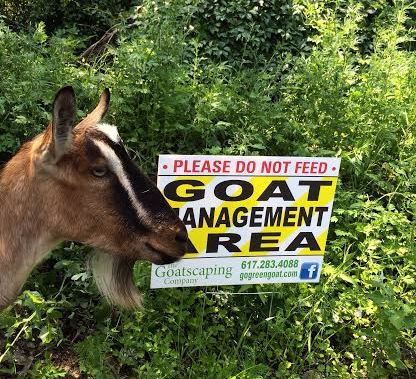Boston, July 23, 2014, — The City of Boston is enlisting the aid of some skilled four-legged helpers in order to combat poison ivy, buckthorn, Japanese knotweed, and other invasive plant species growing on Boston Parks and Recreation Department property. The Parks Department has teamed up with the Southwest Boston Community Development Corporation (SWBCDC) and The Goatscaping Company of Duxbury and Plymouth to host a small group of goats at the West Street Urban Wild in Hyde Park as a sustainable approach to landscape management.

“Goats are an eco-friendly way to regulate overgrowth and manage pests and weeds, while giving nutrients back to the earth,” said Mayor Martin J. Walsh. “I’m pleased that the Parks Department is innovating in their lot care, and I look forward to seeing the results of the goat’s work.”
The idea was generated when teenagers from the Hyde Park Green Team, SWBCDC’s environmental education and job readiness program, approached Mayor Martin J. Walsh to discuss goatscaping at the May 27 Mayor’s Neighborhood Coffee Hour at McGann Playground. Intrigued by the concept and the Green Team’s enthusiasm, Mayor Walsh directed Interim Parks Commissioner Chris Cook to work with SWBCDC on the project.
Goats are currently used on Boston’s Harbor Islands and in other states and major cities including Chicago, Los Angeles, and Washington, D.C., as a safe and responsible way of managing overgrown and invasive vegetation. They do their work quietly and without disturbance, unlike expensive and noisy machinery, or herbicides which can be toxic. There is no hauling or dumping of debris as the goats eat the invasive plants, digest them removing harmful seeds and oils, and then deposit a clean and odorless natural fertilizer back into the landscape. They are also tick resistant, reduce the risk of wildfires, and do not damage the soil thanks to their small hooves.
Four goats will live on-site at the West Street Urban Wild for eight weeks. A low-voltage, solar-powered electric fence will be installed to keep the goats in and coyotes out. The fence is not harmful to humans, including children and the elderly, even those with pacemakers. The goats will have a small hut for shelter. Supplemental water, hay, and grain will be stored on the site.
The public is welcome to view the goats. The goats won’t bite or buck and are very accustomed to the presence of people of all ages. City officials warn, however, that the animals will be living among and eating poison ivy plants and will have poison ivy oils on their fur. The public should not to pet them. In addition, visitors should not tease or feed the goats.
Teenagers from the Hyde Park Green Team will check on the goats daily, and provide them with fresh water and the proper amount of supplemental grain and hay. Any residents interested in helping to help feed and water the goats on weekends must first call (617) 364-7300 to receive a short training from SWBCDC staff.
The goats will eat the large amounts of poison ivy currently covering the urban wild, making it safe for Green Team youth to enter the site to begin tree pruning and trail building. The Green Team will also conduct outreach to engage neighbors in the ongoing care and use of the site for recreation and relaxation. The New Mission High School in Hyde Park has already agreed to work with the Green Team as “Friends of West Street.”
Located at the easternmost part of West Street in Hyde Park, the West Street Urban Wild is a rare piece of greenspace along the Neponset River. The parcel is bounded on the northwest by private residences that front on Pierce Street, on the northeast by West Street, on the east by the Neponset River, on the southeast by an Amtrak and MBTA Commuter Rail right-of-way and on the southwest by privately-owned land. Mostly wooded and flat, the urban wild’s uniqueness lies in its status as one of the few conservation areas along the Neponset River.
Proximity of the site to the MBTA’s Fairmount Line has prompted the Fairmount Greenway Task Force, a coalition of community-based organizations in the Fairmount rail corridor, to add the West Street Urban Wild as a “priority open space development site” in the six-mile-long planned greenway.